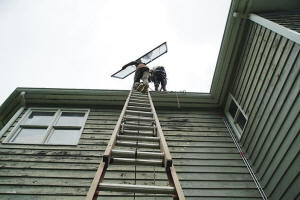In a big bill that hurts clean energy, residential solar likely to get
hit fast
[July 03, 2025] By
MICHAEL PHILLIS
WASHINGTON (AP) — As Republicans in Congress rushed forward with a
massive tax and spending cut bill, a North Carolina renewable energy
executive wrote to his 190 employees with a warning: Deep cuts to clean
energy tax credits were going to hurt.
“(The changes) would almost certainly include the loss of jobs on our
team,” wrote Will Etheridge, CEO of Southern Energy Management in
Raleigh. “I’m telling you that because you deserve transparency and the
truth — even if that truth is uncomfortable.”
The bill now in the House takes an ax to clean energy incentives,
including killing a 30% tax credit for rooftop residential solar by the
end of the year that the Biden administration's Inflation Reduction Act
had extended into the next decade. Trump has called the clean energy tax
credits in the climate law part of a “green new scam” that improperly
shifts taxpayer subsidies to help the “globalist climate agenda” and
energy sources like wind and solar.
Businesses and analysts say the GOP-backed bill will likely reverse the
sector's growth and eliminate jobs.
“The residential solar industry is going to be absolutely creamed by
this,” said Bob Keefe, executive director of E2, a business group that
advocates for pro-environment policies.
President Donald Trump's “Big Beautiful Bill” takes aim at renewables
broadly, including phasing out tax credits enjoyed by utility-scale
solar and wind. But cutting the residential solar credit will happen
sooner.

Companies have announced more than $20 billion in clean-energy
investments in North Carolina in recent years. Etheridge, whose company
installs solar panels and helps ensure buildings are energy efficient,
was among many in the sector to lobby Republican U.S. Sen. Thom Tillis
of North Carolina for changes in the bill.
Tillis ultimately was one of three Republicans to vote against the
measure, but in a sign of Trump’s power over legislators to pass it,
Tillis said he wouldn’t seek reelection after Trump said he'd likely
support a primary challenger.
Now, Etheridge says losing the tax credit will likely mean laying off 50
to 55 of his workers. He called the elimination of residential tax
credits a “bait and switch.”
“I made a decision from being an employee to taking out a loan from my
grandmother to buy into my business and put my house on the line” in
part because of the stability of the tax credits, he said. He said he'll
scramble now to figure out ways to diversify his business.
[to top of second column] |

Solar panels are installed on a home in Chapel Hill, N.C.,
Wednesday, July 2, 2025. (AP Photo/Allen G. Breed)

“If you require a money-spigot from Washington to make your business
viable, it probably shouldn’t have been in business in the first place,”
said Adam Michel, director of tax policy studies at the Cato Institute,
a libertarian think tank.
Michel said he doubted many clean energy companies would go out of
business, but “I think that they will be right sized for the market and
that the people that are employed with them will find better jobs and
more stable jobs in industries that are actually viable and don’t
require billions of dollars of federal subsidies.”
Even ahead of debate over the bill, experts at E2 said in May that $14
billion in clean energy investments across the country had been
postponed or cancelled this year.
The bill the Senate passed Tuesday removes a tax on some wind and solar
projects that was proposed in a previous version and gives utility-scale
projects some time to begin construction before phasing out those tax
credits.
Karl Stupka, president of Raleigh-based NC Solar Now that employs about
100 people, said the Senate's bill eased the impact on commercial
projects “while destroying the residential portion of the tax credits.”
Roughly 85% of his business is residential work.
“They took it away from every average American normal person and gave it
to the wealthier business owners,” he said.
Stupka said if the bill becomes law, companies will rush to finish as
many solar jobs as they can before the credit ends. He expected to lay
off half his employees, with “trickle-down” job losses elsewhere.
“It would cause a pretty severe shock wave,” he said.
All contents © copyright 2025 Associated Press. All rights reserved
 |